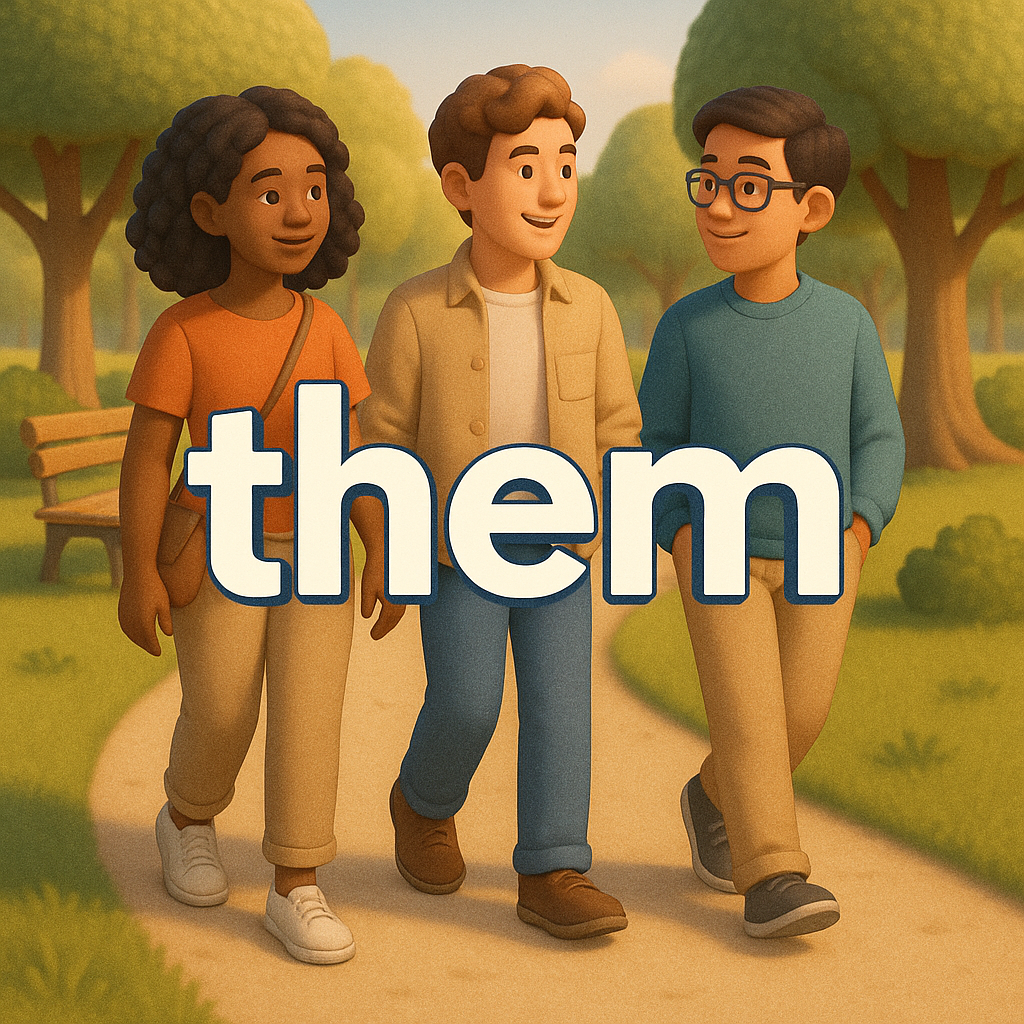Them
Definition
Them is a pronoun used to refer to people or things previously mentioned or easily identified, typically as the object of a verb or preposition.
Parts of Speech
- Pronoun
Pronunciation
American English
- IPA Pronunciation: /ðɛm/
- Respelling: THEM
British English
- IPA Pronunciation: /ðɛm/
- Respelling: THEM
Etymology
The word "them" originates from Old Norse "þeim," the dative plural form of "þeir," which replaced the Old English "hym" and "hem" in Middle English.
Derivatives
- Themselves (pronoun)
- Themself (pronoun, singular nonstandard)
- Thematic (adjective, related)
- Anthem (noun, related by root)
- Them's (colloquial contraction, informal)
Synonyms
- Those
- These
- They
Antonyms
- None
Usage
The pronoun "them" is used to refer to a group of people or things, as in "Give the books to them." It is also used in casual speech as a singular pronoun, as in "Give it to them" to avoid specifying gender.
Related Terms
- They: A plural pronoun used as the subject.
- Themselves: Reflexive form of "them."
- Those: Demonstrative pronoun referring to specific things or people.
Detailed Definitions
Pronoun
- Used to refer to a group of people or things: Refers to the plural object of a verb or preposition.
- Example: "I saw them at the park."
- Used as a singular pronoun in nonbinary or informal contexts: Refers to a person of unspecified or nonbinary gender.
- Example: "Someone left their jacket; can you give it to them?"
them



🇨🇳 Chinese (Mandarin)
- 他们 (for people of male or mixed gender)
- IPA Pronunciation: /tʰaː˨˩liːn˧˥/
- English respelling: tāmen
- 她们 (for people of female gender)
- IPA Pronunciation: /tʰaː˨˩liːn˧˥/
- English respelling: tāmen
🇮🇳 Hindi
- उन्हें (for animate)
- IPA Pronunciation: /ʊːnɦeːn/
- English respelling: unhēn
- उनको (for inanimate)
- IPA Pronunciation: /ʊːnkoː/
- English respelling: unko
🇪🇸 Spanish
- Ellos (for masculine or mixed groups)
- IPA Pronunciation: /ˈeʝos/
- English respelling: ellos
- Ellas (for feminine groups)
- IPA Pronunciation: /ˈeʝas/
- English respelling: ellas
🇫🇷 French
- Eux (for masculine or mixed groups)
- IPA Pronunciation: /ø/
- English respelling: eux
- Elles (for feminine groups)
- IPA Pronunciation: /ɛl/
- English respelling: elles
🇸🇦 Arabic (Modern Standard Arabic)
- هُم (for masculine or mixed groups)
- IPA Pronunciation: /hum/
- English respelling: hum
- هُنَّ (for feminine groups)
- IPA Pronunciation: /hunna/
- English respelling: hunna
🇧🇩 Bengali
- তাদের (for animate)
- IPA Pronunciation: /t̪ader/
- English respelling: tader
- এগুলো (for inanimate)
- IPA Pronunciation: /eɡulo/
- English respelling: egulo
🇷🇺 Russian
- Они (for animate)
- IPA Pronunciation: /ˈonʲɪ/
- English respelling: oni
- Их (for inanimate)
- IPA Pronunciation: /ɪx/
- English respelling: ikh
🇵🇹 Portuguese
- Eles (for masculine or mixed groups)
- IPA Pronunciation: /ˈɛlis/
- English respelling: eles
- Elas (for feminine groups)
- IPA Pronunciation: /ˈɛlɐs/
- English respelling: elas
🇮🇩 Indonesian
- Mereka (for people)
- IPA Pronunciation: /məˈrəka/
- English respelling: mereka
- Itu (for things)
- IPA Pronunciation: /itu/
- English respelling: itu
🇩🇪 German
- Sie (for both animate and inanimate)
- IPA Pronunciation: /ziː/
- English respelling: sie
🇯🇵 Japanese
- 彼ら (for people, masculine)
- IPA Pronunciation: /kaɾeɾa/
- English respelling: karera
- 彼女ら (for people, feminine)
- IPA Pronunciation: /kaɲoʑoɾa/
- English respelling: kanojora
🇻🇳 Vietnamese
- Họ (for people)
- IPA Pronunciation: /hɔ˧ˀ˦/
- English respelling: họ
- Chúng (for things)
- IPA Pronunciation: /cɯŋ˧ˀ˦/
- English respelling: chúng
🇰🇷 Korean
- 그들 (for people)
- IPA Pronunciation: /kɯdɯl/
- English respelling: geudeul
- 그것들 (for things)
- IPA Pronunciation: /kɯkʌtdɯl/
- English respelling: geugeotdeul
🇹🇷 Turkish
- Onlar (for both animate and inanimate)
- IPA Pronunciation: /onlar/
- English respelling: onlar
🇵🇰 Urdu
- انہیں (for animate)
- IPA Pronunciation: /ʊnhẽː/
- English respelling: unhēn
- ان کو (for inanimate)
- IPA Pronunciation: /ʊnkoː/
- English respelling: unko





